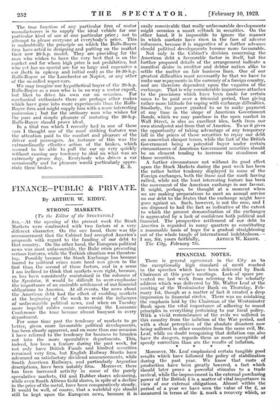FINANCE-PUBLIC & PRIVATE.
By ARTHUR W. KIDDY.
STRONG MARKETS.
( To the Editor, of the SPECTATOR.) SIR,—At the opening of the present week the Stock Markets were confronted with two factors of a very different character. On the one hand, there was the announcement that. the Cabinet had accepted. America's proposals with regard to the funding of. our debt to that country. On the other hand, the European political news was most unfavourable, the Ruhr crisis presenting serious features, while the Turkish situation was threaten- ing. Possibly because the Stock Exchange has become inured to political crises more heed- was given to the first than the second of these factors, and in a sense I am inclined to think that markets were right, because, as has been consistently maintained in the columns of the Spectator, it would be difficult to over-emphasize the importance of an amicable settlement of our financial obligations to America: At all events, the news about the American debt had the effect of enabling markets at the beginning of the week to resist the influences of unfavourable political news, and when . on. Tuesday L more hopeful cables came concerning the Lausanne Conference the tone became almost buoyant in every department. For some time past the tendency of markets to go better, given more favourable political developments, has been clearly apparent, and on more than one occasion I have referred to the tendency for business to broaden out into the more speculative departments. This, indeed, hai been a feature during the past week, for not only have British Funds and kindred securities remained very firm, but English Railway Stocks have advanced on satisfactory dividend announcements, while South American Railways, and particularly Argentine descriptions, have been notably firm. Moreover, there has been increased activity in some of the purely speculative markets, Oil and Rubber shares advancing, while even South African Gold shares, in spite of a decline in the price of the metal, have been comparatively steady. It would be well, of course, that a watchful eye should still be kept upon the European news, because it is easily conceivable that really unfavourable developments might occasion a smart setback in securities. On the other hand, it is impossible to ignore the manner in which markets have risen in the face of adverse influences, because it is suggestive of a further advance should political developments become more favourable.' Not only is the Cabinet's decision concerning the American debt a favourable factor in itself, but the further proposed details of the arrangement indicate a manifest desire in creditor and debtor nation alike to settle the matter on fair business lines. One of our greatest difficulties must necessarily be that we have to make our repayments in the currency of a foreign country, and are therefore dependent upon the vagaries of the exchange. That is why considerable importance attaches to the provisions which have been made for certain sums to be paid over a triennial period, thus giving rather more latitude for coping with exchange difficulties. Similarly, the power granted to us to make payment at any time in the shape of American Government Bonds, which we may purchase in the open market in Wall Street, is also an excellent idea, both from our own standpoint and from that of America. To us it gives the opportunity of taking advantage of any temporary fall in the prices of those securities to repay our debt on somewhat cheaper terms, while the fact of the British. Government being a potential buyer under certain circumstances of American Government securities should be an element tending to increase the steadiness of those securities.
A further circumstance not without its good effect upon the Stock Markets during the past week has been the rather better tendency displayed in some of the Foreign exchanges, both the franc and the mark having rallied, while not the least interesting feature has been the movement of the American exchange in our favour. It might, perhaps, be thought at a moment when we are making preparations to meet an annual service on our debt to the States that the exchange might have gone against us. Such, however, is not the case, and I am disposed to hail the fact as indicative of the extent to which the present demoralization of the exchanges is aggravated by a lack of confidence both political and financial. The prospective settlement of our debt to America is regarded in many quarters as constituting a reasonable basis of hope for a gradual straightening out of the whole tangle of international indebtedness.—


































































 Previous page
Previous page